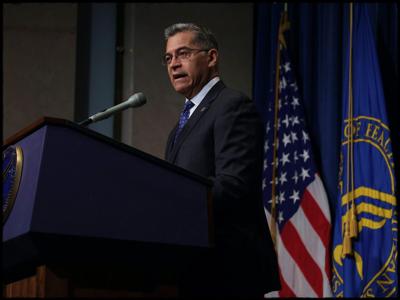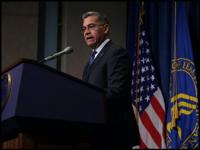
U.S. Secretary of Health and Human Services Xavier Becerra speaks during a news conference at the headquarters of HHS June 28, 2022 in Washington, DC. (Photo by Alex Wong/Getty Images)
On Tuesday morning, months away from California's gubernatorial primary, Xavier Becerra, a former congressman, state attorney general and the nation’s health and human services secretary during the President Joe Biden administration, sat with California-based media to talk about issues affecting Latino communities and his candidacy for the state's highest seat.
“I am the son of immigrants,” Becerra said in his opening statement to the virtual event hosted by the Latino Media Collaborative, CALÓ News’s parent organization and an advocate for sustainable journalism throughout the state.
As part of the media roundtable, Becerra touched on timely issues such as the current immigration raids by federal agents, homelessness and media equity, as well as the Mexico and U.S. border.
Becerra said one of the things that differentiates him from the current California governor, Gavin Newsom, is his identity and upbringing.
“To know where a political figure will take you, you must know where they are coming from,” he said. “I bring with me to any position the experiences of someone who did not grow up with much but had to fight and persevere.”
Becerra has openly spoken about growing up in Sacramento, California, as the third of four children in a working-class family with immigrant roots. His mother, Maria Teresa, was raised in Guadalajara, Mexico and moved to the U.S. after marrying Becerra's father, Manuel. His mother worked as a secretary and his father, a first-generation citizen, had numerous physically demanding jobs to support his family, including working in the fields, fixing railroad cars and working in road construction.
He said growing up in a working-class family informed his sense of justice and his policy priorities later in life and now as a candidate for governor.
At Tuesday's media roundtable, he talked to journalists about media equity, his vision for a more equitable media industry and funding local news initiatives.
In recent months, multiple journalists, many from local news outlets, were attacked by law enforcement as they were trying to document protests and local marches.
In June, a recent lawsuit was filed on behalf of news organizations against the Los Angeles Police Department over the treatment of journalists during the anti-ICE raids that took place in Downtown L.A.
The lawsuit, filed by the LA Press Club, stated that local police harassed reporters following street demonstrations, all while violating reporters' First and Fourteenth Amendment rights, as well as state laws intended to limit the use of so-called “less-lethal munitions.”
Legislation such as A.B. 1115, signed into law by Newsom last year, requires state leaders to develop plans for increasing expenditures directed to ethnic media outlets and improve outreach to underserved populations. Despite that, media advocates argue that more protection and support are needed, especially when attacks on the media are at an all-time high.
On Tuesday, Becerra said one way to improve news equity is to ensure every Californian is well-informed by trusted local media outlets. “We have an obligation to get correct information out to communities, all communities,” he said. “As governor, I'll be looking for those reliable sources of information, those credible sources that have proven themselves effective at disseminating truthful information, facts and data.”
He also said he would create a direct fund to sustain and better support local and nonprofit news, as well as work toward a media landscape that is accessible to Spanish-speaking households or households that speak other languages aside from English.
“There is no particular funding that I'm aware of at the state level that is specifically geared to provide media with financial support. I'll make sure that we continue as a state as a whole, continue to communicate and seek ways to communicate with communities in more than just English,” he told journalists. “We don't want to lose those [types of] media and find that we end up with just a few conglomerates purveying the news and not really doing a good job of reaching those communities.”
Last month,on a 6-3 decision, the Supreme Court sided with the Donald Trump administration,ruling that federal immigration officers may briefly detain and question individuals about their legal status solely based on appearance, speaking Spanish, or frequenting known day laborer gathering spots.
Barrera said, if governor, he would continue to support the immigrant community and ensure that the federal government does not break the law. “We will be prepared to use the courts where necessary,” he said. “One of the most important things we can do is make sure we lay down the law to the federal government so they don't think that they can just do what they wish in our communities.”
Becerra also referenced California'snew state law,S.B. 627, signed by Newsom last month, which bans federal Immigration and Customs Enforcement (ICE) agents from wearing masks to conceal their identities while on duty.
The “No Secret Police” act aims to increase transparency during immigration raids and it’s slated to go into effect in January 2026.
“We now have a better tool to try to stop federal law enforcement from overreaching; [it] doesn't stop them from doing immigration enforcement, but it stops them from trying to do things that are against the law in California,” he said.
He also said one of the most important measures to better protect communities from federal ICE agents' unlawful behavior is documentation.
“The best way to stop the abuse is to document it and therefore prove that the federal government has overreached,” he said. “When we can't prove it, as you've seen on too many occasions, they get away with it. We have to be the best witnesses for the people who are being victimized by Trump's ICE enforcement.”
Becerra also answered questions pertaining to housing and housing insecurity in the state. When asked how he plans to balance housing growth and security without displacement of communities of color, Becerra said he plans to “build smart without displacing and gentrifying communities.”
“The reason we are accelerating the construction of more housing is to house more people, not to displace people or enter [them into] the ranks of the homeless,” he said. “We will do everything we can under law to make sure that people aren't displaced simply so [we] can build more.”
He references the building of affordable housing in places close to public transit as an example of building smart.
Los Lirios, a mixed-use housing development for low- and moderate-income households, opened in Boyle Heights last year. The five-story, 64-unit affordable housing complex is located right outside of the Metro E Line Soto station.
The type of housing aims to increase the supply of affordable housing and tackle the housing crisis in the city and county of L.A.
“It's very convenient for folks, so they don't have to always have a car or travel long distances to live close to where the transit systems are. That way it's easy for them to get to work or get to school,” Becerra said. “We'll be able to tackle this and the state will be a real close partner in helping incentivize that housing is built and that we have the mix of market and affordable housing that we'll need so we don't displace people as we move forward.”
Becerra also talked about California's relationship with Mexico, which he referred to as “neighbors.” He said as governor, he looks to enhance collaboration with Mexico, the country’s states and their shared border.
“I view Mexico as one of the most important partners of the U.S. and one of the most important international partners for California,” he said in Spanish. “I will do everything in my power to not only have a better partnership with Mexico and its states but also have a better relationship with our brothers and sisters in Mexico. The economy of California, our wins, and the opportunities for more safety must involve both governments.”








(0) comments
Welcome to the discussion.
Log In
Keep it Clean. Please avoid obscene, vulgar, lewd, racist or sexually-oriented language.
PLEASE TURN OFF YOUR CAPS LOCK.
Don't Threaten. Threats of harming another person will not be tolerated.
Be Truthful. Don't knowingly lie about anyone or anything.
Be Nice. No racism, sexism or any sort of -ism that is degrading to another person.
Be Proactive. Use the 'Report' link on each comment to let us know of abusive posts.
Share with Us. We'd love to hear eyewitness accounts, the history behind an article.